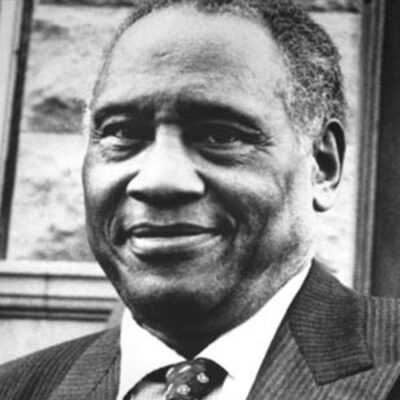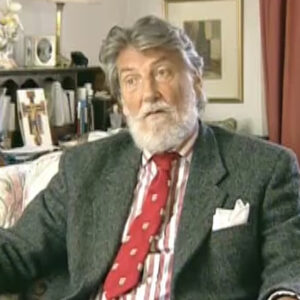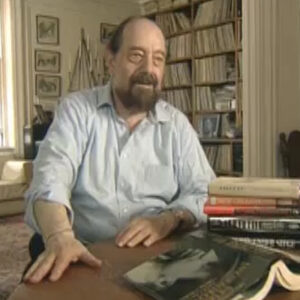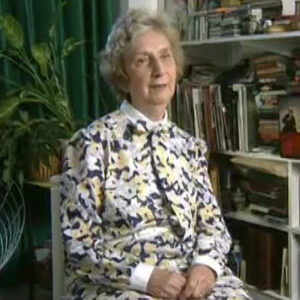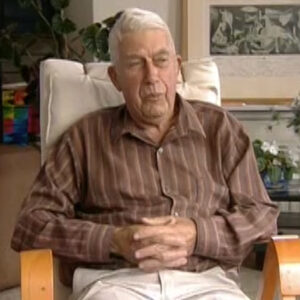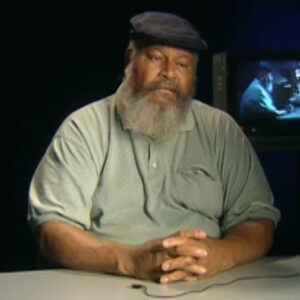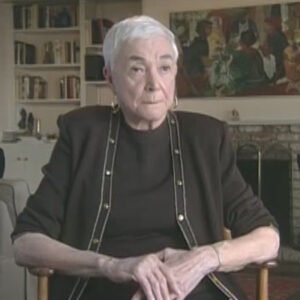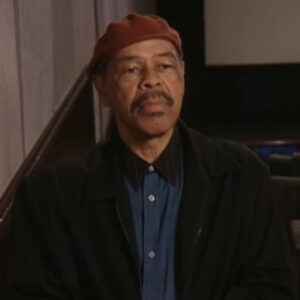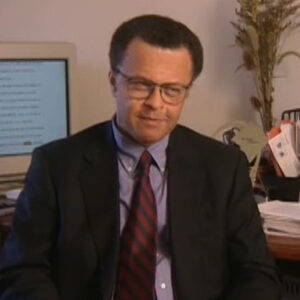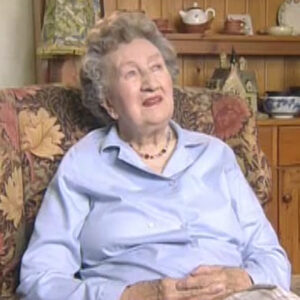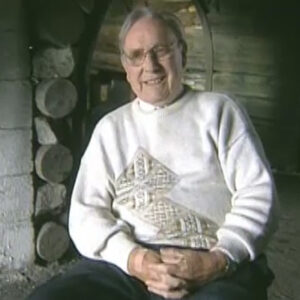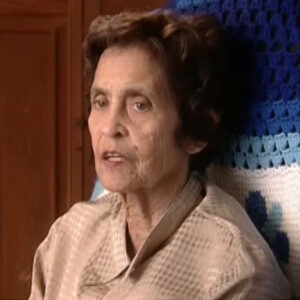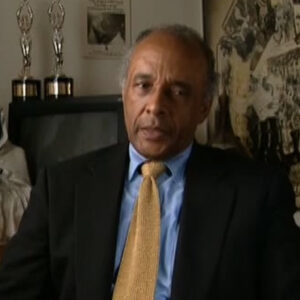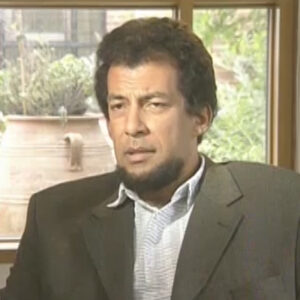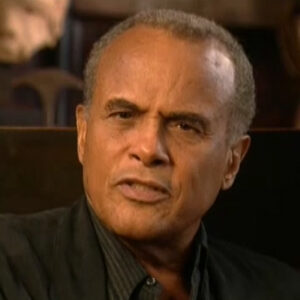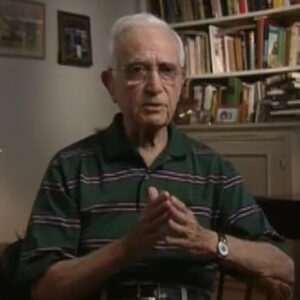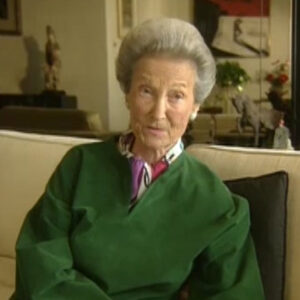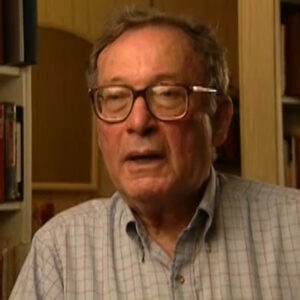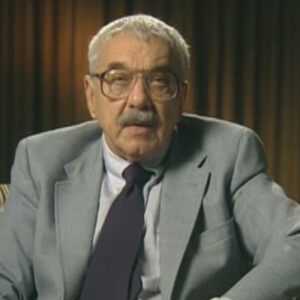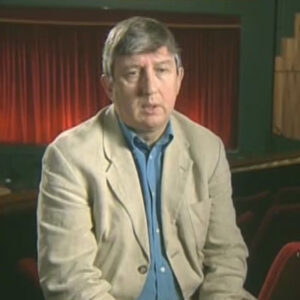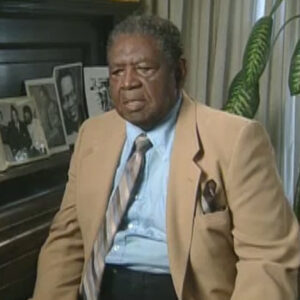Speaker In 1945, I think it was I was one of the members of an organization called the American Youth for Democracy, which was no antifascists youth organization, and we were recruiting members and so on. And the person who got the most was to go to the Erlanger Theater in Chicago to see Paul Robeson and high them and Joseph Ferar and. And so those of us who one got a chance to go backstage to meet him. So that was the first time that I met Paul Robeson. You want I went? Yes.
Speaker Were you always I mean, did your commitment to the left politics come out of family or was it out of experience?
Speaker Personal experience, primarily out of experience. But my father was a trade unionist. No fooling.
Speaker OK, so basically in the 40s now, were you aware what you have to understand, that the World War Two is going on and it was a good thing to be, you know, progressive and left at that time are.
Speaker Uh, so it’s in the 40s. What kind of position was robust and how was he viewed by left people, how they viewed by the mainstream when you first got introduced?
Speaker When I was first introduced him, he was a hero on the left. There’s no question about it. But I also think he was a general hero among black people, that there were different ways in which people saw his movies, you know, black people saw his movies.
Speaker Some thought it was a step in the door. And therefore it was an important contribution that he was making. Some were critical because they felt that he was doing it just to make money. And when they didn’t see that he was being the artist that he wanted to be. But by and large, I think that African-Americans saw him pretty much like they saw Lena Horne and other folks who acted and in that period. And so that’s how I remember people seeing him. And then when he appeared in Othello, it was a major thing. It was a major thing in the black community. I lived in a housing project which was one of these experimental projects called Cabrini. You know, where it was before it was Cabrini Green, where it was completely mixed in terms of the population. And people were just I mean, they were gaga over the whole idea that Paul Robeson would come into that project, which he did, because there was a narrow group of people who lived there and worked in the progressive movement and they were antifascist and so on. So you could see it there, but you could also see it in the churches and so on when people really did admire him a great deal.
Speaker Now, within left circles, was there any tension between left and black?
Speaker Always, you know, from from the very beginning. And I remember even as a kid, 13, 14 years old, where kids would say, well, my mother says, you know, why? Why are you involved with these communists? You know? And that was even before it was Communist Party. It was in that little brief period of the Browder period, you know, before forty six. And they were still kind of anti not anti-communist. But, you know, why be mess yourself up with that. You know, I mean, you know, black folks, good church. And that’s what we do. You know, we’re in politics. We vote for William L. Dawson and know that’s that’s what we do. You know, we’re precinct captains, but we don’t mess around with communists. No, no.
Speaker OK, so now what I know is a great deal of black intellectuals and artists are attracted to leftist policies, particularly at that time, the Communist Party. Why do you think that is anymore?
Speaker Well, I think there were two things, one, the commitment that the Communist Party had, like no other organization, no absolutely no other organization in the country here, including, I might add, black organizations did not have the commitment to the kinds of equality that the Communist Party talked about, you know, complete social, economic, cultural equality. And, you know, nobody would just dare make that, including those people who knew what had happened with the Scottsboro case. And people all over the country knew what had happened with the Scottsboro case. William L. Patterson and Louise Patterson, who lived in Chicago at the time that that I lived there. And they have become very active in the civil the civil rights Congress have become a major organization then, and they could walk in any black community and people would say, hello, Mr. Patterson. You know, they knew who he was and they respected him for it. And no amount of red baiting could take away that kind of dignity that he could carry. So I think that that was the first thing that this this commitment to equality was there reds or communists were known to have among them people who had some influence in the cultural world.
Speaker And they utilize that influence very often to help make it possible for people involved in the intellectual and artistic community to be to be make their contributions there.
Speaker And so there was a there again was this question of of equality, but an ability to show and tell, as it were, and not just talk about it, but to be able to put people in certain places where they could, you know, utilize their artistic capabilities.
Speaker Do you think, OK, plays Paul Robeson in that context? Was he therefore a front man for the communists or was he influenced by their ideals and ideas and therefore incorporated into his death? Or was it mutual use part of it play out?
Speaker Well, from where I sat and have to understand, I was quite young at that particular time. But, you know, as I grew older, I also saw a great deal of Paul Robeson was really influenced by the ideas and ideals, not just the ideas, but the ideals of communists and people who were people who were influenced themselves by communists, who were not communists, for example, Langston Hughes. You know, when Langston Hughes went to the Soviet Union, there were a whole number of black folks who went along with him, you know, and when they when they came back, you know, they not only talk to, you know, try to talk to the media, they talk to each other. And they were all part of this new Harlem Renaissance. But but a new black renaissance throughout the country, I think. And again, this was during and after World War Two that we’re talking about. And I know about where it was important for black people to continue to make that that link between the double V, you know, the V for victory over fascism and the V for victory over discrimination here at home, or Jim Crow, as it was called, show that that was an important time. So by 1948, you have to remember, this is a long time ago to a lot of people. For me, it was, you know, I’m getting to be 18 in 1948. And Paul Robeson was the figure around the world. Henry Wallace, campaign for president, the Progressive Party. And he was so he was so dedicated to that campaign that that was not a question of utilization in any way. This was a question of being a committed human being to the practices of what he thought would make some changes in this country that we can finally get to a point where we would come to fruition, this whole idea of this double V..
Speaker OK, a couple of specifics I need to know. Like, did the party take orders from the Soviet Union in formulating African-American policies?
Speaker I my own concept of this right now, I knew a man whose name was Cheryl Briggs, I knew Cheryl very, very well. You know, we had lunch every week, you know, for 20 years. So I knew Cheryl very, very well. Explained to Cheryl Briggs was the person from the Black Blood Brotherhood from 1917. And journalists had come from the West Indies. And he was the person most responsible for the writing around this whole idea of self-determination for people in the black belt, the black belt of the United States, and an age old communist who joined, I guess, the Communist Party in the very early 20s. But, you know, Cheryl and I used to talk about this a great deal, and he he was extremely pro Soviet.
Speaker But the way Cyril talks about it is that in the Comintern, it was the African-American communist who pushed this question of the national question, saying that the similarities of the national question that had been talked about by Lenin, you know, in imperialism and in state and revolution, the importance of this, what he considered the national question to the development of democracy in the United States, and that that was pushed in the Comintern coming from the United States, not coming from the Soviet Union to the Comintern. So do you see what I’m saying? And in relation to that, um.
Speaker Did the growth in take part in or did he influence party leaders to influence policy decisions?
Speaker And if so, let me let me tell you something.
Speaker In 1957. I became a member of the National Committee of the Communist Party, so that’s quite a while ago. I never, in the whole history of my being in that position, saw Paul Robeson in a meeting Communist Party ever.
Speaker He came to meetings that were sponsored by the Communist Party, for example, at a meeting, I think, at Carnegie Hall. He came as a guest speaker, but so did a whole number of other people come to such meetings. So I never knew Paul Robeson as a communist, as a member of the Communist Party. I went to a meeting where a big meeting and I can’t because I didn’t live in New York at the time. I lived in Los Angeles where he came to talk on the issue of the nuclear, the atom bomb and the development of it and what was going on with the development of hydrogen bombs and so on.
Speaker And he talked about the importance of black white unity, which was something that that he pushed a great deal wherever he spoke.
Speaker And he spoke about that in terms of the importance of human beings to human beings and why it was so important to bring about any kind of real concept of equality, that this had to be grasped by by people. And I remember when his son, Paul Jr., was getting married and he spoke just basically in a big meeting about that, the importance of this relationship between his son, an African-American, and another people who had been so oppressed, the Jewish people in the United States. And he was he was just very open and aboveboard about these questions. And I think that they were heartfelt. I mean, and if anything, you could ever see about Paul Robeson, what he thought you could see it in his face, you really could. This man was really very much involved in what he thought and what other people thought. And I remember going to see him in Los Angeles at the home of Petis, Perry Petis. Perry was another member of the Communist Party, you know, and many people didn’t know about Perez that until he was well into his 40s.
Speaker He could not read or write and not only learned after he felt that it was important to learn, to read and write, but he learned to read and write in Spanish as well. And he was completely fluent in Spanish, completely. But but they lived in a very small house. Three boys, two of the younger ones were my son’s friends and his his wife was Italian. And very early in the morning, police called up and called me at home and I was on my way to work and he said, come over. I have a special guest for you to meet. And I went over and there is sitting this giant, Paul Robeson. Right. And they had a small house so that the kitchen table, a little round one, would sit right there in the doorway kind of. And and I remember Petis with scrambled eggs. And I never liked the way he scrambled eggs, scrambled them in the skillet, and I wanted mine. But anyway, he he had made these eggs for Paul is sitting with his legs out in the living room and his body kind of in the kitchen because he was such a big man.
Speaker But he it was no question of humble. I mean, he was just completely at home there.
Speaker He was just completely and that kids would walk by and and sit on his lap and grab them and stuff and, you know, leave me alone right now. I mean, that kind of thing. He was he was amazing. And so he was I can’t imagine anybody dictating to Paul Robeson policy.
Speaker I can imagine people having a major discussion with him. But in the book I showed you before the first autograph there was from Ben Davis. Right. And I was really very pleased because the book had just been published. And Ben said he wanted to give me give me something because I was visiting New York and and I was at his house. And so he wrote that and it was really very nice. His daughter had just been born and it was at Petis, his house that I had given him this book to to sign. And that’s how it happens, that they’re both in the same book. It wasn’t at the same time. And then, you know, but I’m going back and forth and I realize that’s OK.
Speaker That the what was well, did Paul have I mean, he was humble at home, but did he also have a sense of who he was? What do you think? Oh, yes. Now I mean, who he was.
Speaker But in terms of his importance to Lebanese.
Speaker As I think he knew, he was a celebrity and I think he felt it, I felt he felt he deserved it all, but it didn’t it seemed very often to hamper what he wanted to do more than it was helping him do what he wanted to do, which is why he he did what he did, I think, to take a break from yielding to what Hollywood was demanding of him. You know, he could have he could have.
Speaker What was his relationship to Ben Davis?
Speaker They were very close. They were very, very close. And he would I think part of it had to do with the fact that Ben Davis had been a city councilman. And that Paul had been helpful in that campaign.
Speaker He was a good idea and because, you know, he was very, very, very much involved and in anything that was happening in the black community. And, yeah, because Ben was a city councilman right after Adam Clayton Powell, you say he was involved because he would come to meetings of just no meetings where Ben was speaking or he would speak, you know, on the platform. And as you recall, he was also supportive around Marcantonio Beedle Marcantonio. So it was no, it was not a surprise that he would be active in another progressive campaign. And toward the end, of course, Adam Clayton Powell even supported Ben. So it wasn’t just the question that it was know you were a communist to support him, but no, you were a progressive and you would support him. And clearly you had to be supported by somebody because you won.
Speaker But he became a city councilman when when I went for him, basically campaigning for Ben Davis.
Speaker What were the odds of what were the odds of of, uh, winning?
Speaker I mean, was it a wasn’t a sure thing?
Speaker It certainly was not a sure thing. But because you have to remember, Ben had a tremendous amount of support and, you know, he he always lived up here. He lived over there 140 days in Riverside forever, you know. So, you know, it wasn’t it wasn’t that he was an unknown in the community. And there were a lot of things that had been done it. For example, Steve Stevens, who was certainly not I shouldn’t say, certainly hope Stevens, who was not a member of the Communist Party but was certainly involved in all this business about getting black bus drivers in Harlem and so on. Well, these are campaigns that these folks worked on together or Michelle know from Michelle’s bookstore. And, you know, all these, you know, people, communists and communists who worked together in Harlem.
Speaker And I think it was around that time that black people were less anti-communist than they were before. As a matter of fact, there was an article and an editorial in the Amsterdam News, and I think it was in that 1959 and it said, where where are the communists now that we need them or something like that?
Speaker It was because it was some demonstration that was taking place and they were. And the editorial, of course, went on to show that communists could not be there at that time because it was kind of the height of the repression.
Speaker What about that? Was was was Ben Davis a an adviser and confidant of older brother type or were they buddies?
Speaker Well, they were more like buddies. They were buddies. I mean, they they had dinner together. They went out together. You know, they were friends. Yeah. After we passed.
Speaker I think Pat and Robeson were also very close as friends, pretty much like I would imagine, just like today. Ossie Davis is very close with he was at Lewis Patterson’s birthday party, you know, and I think that it’s that people are generally when they get to know each other and struggle, but also that that is included in a genuine getting to know each other, that people become very close friends. It’s not just a political relationship.
Speaker You know, the thing that I’ve been coming to know, to realize actually that no one Rowson was a real pop star celebrity and he was, you know, the Michael.
Speaker But he was a pop star. Oh, yeah. And he was a it was as if Michael Jackson and Malcolm melded in a way. Oh, in a strange kind of way.
Speaker And that’s a hard part. But I think that if you if you put that together with the people at that time who were, you know, the Sidney Poitier and Harry Belafonte and so on, these are the people who were around and who worshipped Paul, you know, so that you would get to know get that feeling from them.
Speaker What were the what how much influence did rank and file black people, black, communist, how much influence they have on party decisions?
Speaker Oh, lots. Yeah, well, let me put it this way, there were a number of black people who were active in their unions, particularly UAW, United States, the U.S. steel unions, my Midland smelter, food and tobacco are the United Steelworkers.
Speaker These are some I know firsthand because I worked with them. All of these people were involved very much in terms of their union activity. And as you know, trade union activity was a tremendous amount of the work of the Communist Party. The policy work and so on. And the whole concept of black and white unite was based on black and white workers uniting, you know, because that that was the way to beat the boss. And in many ways, you had a series of of organizing drives in the South, which meant that people like Thomas.
Speaker OK.
Speaker OK, what was the question? It was just the phones are ringing, all right.
Speaker Right, right. Miranda Smith was an organizer in North Carolina and the tobacco workers and Miranda Smith had a tremendous impact on the court. And she was a rank and file member of the court. I mean, in other words, she was not a member of the National Committee. She was not on the political bureau or anything like that. Then there was people like James Jackson who had, you know, who was at one time rank and file. You have people like in Detroit, a guy named Lee Kane from UAW who, you know, did become a member of the leadership, but at first was a regular rank and file member. You know, I can just name folks like that throughout the country.
Speaker But was this because of their forceful individual personality or was it was their a structure that allowed them to put there?
Speaker Well, let me also I guess what I’m getting at is no one was there for them to express themselves and to push policy, but also the cultural divide of just black and white culture get in the way of that, even in the culture.
Speaker Well, in the party, from the time that I know about and I joined the party in 1946, there was first called the Black Liberation Commission. And then it was later on a commission on African-American affairs or something like that, and later on just called the African-American commission.
Speaker That did not necessarily mean that it was all black, but it was certainly primarily black. And in some places it might have been even all black, but it was that that gave that made policy at least suggested the policy that was to be adopted by the National Committee and the National Convention. And so you would have the resolution, for example, coming from the Black Liberation Commission that would be submitted to the National Convention for debate and it would go into preconvention discussion. And then after that, and there were differences. Very often there were differences. As a matter of fact, that’s how the change came about on the question of self-determination in the black belt.
Speaker And that was a long discussion that went on from the forties to 1959, I believe, when the party finally discarded the nationhood theory.
Speaker OK, now this may be a loaded question because it sort of follows and it may not be a question, but what were the major areas of conflict between black and white party leaders?
Speaker Tricky question, but between party leaders, black and white, between black and white, for my party members, I guess like one but but influential party.
Speaker Well, I think four out there has always been and still does exist, and the left that question of class or race.
Speaker Or class and race.
Speaker I know this is there’s always been this problem. The reason that there are more black folks, probably even today, although I’m not sure of that since I’m not in the party any longer. But people who at least consider themselves coming from that party reference, which I still do, are people who say that class, race and gender. Are important issues to be seen as one? One thing and that you cannot achieve one without the other, the equality of one without the other, and you certainly cannot achieve class rule without all three of those things, working class rule, without all those things and show the differences then in the party were and probably still are. And I know in my organization, the Committees of Correspondence, they certainly do exist between the weight that you put on the struggle against racism at a given moment.
Speaker And and how how far out do you go, for example? Oh, it takes black people who aren’t in the party deal with them, black people who are in the party or affiliated with it.
Speaker And then white, I see. Are the three different. So that’s where I roll.
Speaker For example, let’s take affirmative action. Affirmative action. The biggest fight for affirmative action began with Kaiser Steel and in USA.
Speaker In your question, can you give an example that Rose and that was connected to this? Because it would help if you can. It’s OK.
Speaker I’ll try.
Speaker Well, hold on, let me look at the moment, you think about what we think of there was the question in the cultural field, you know, among among both black, between black people and other black people and between black and white communists as to how they viewed Richard Wright, for example.
Speaker Right. And the work that he was doing now.
Speaker But I say the differences were among black people themselves, but also between black and white. But where Paul was concerned, my my recollection is and my understanding is that he did not involve himself. In those battles, I don’t know why, I really don’t know why I can surmise why that the way he felt about black and white, the importance of this issue was too important to him to go away from. But the other reason was that the differences that he might have had with some of his black cultural friends, if he had those differences, he did not also want to go on the side that would seem opposed to them.
Speaker And I think he said I think he would have different and just in discussions, I think he would have different with some of the cultural directions in terms of specifically what do you think his position? Well, I think in terms of how black people were shown with each other and shown with whites, and I think he would have he might have I don’t say would have that he might have seen that that they were moving too far into away from normal, quote, normal black life to that in terms of the more deprived.
Speaker I don’t want to use the word. I don’t want to use a word like depraved. I want to use, like, bigger Thomas. No, that that influence. And I think there are a lot of people who felt that way. And I tell you where you could see the difference. Donald them. And and then we heard the Thunder or Youngblood and the difference between how one would see that and how one would see Richard Wright’s black boy, didn’t you know what I’m saying?
Speaker That I am not doing this well. So maybe I’ll get it right. I know it’s OK. And I think that that possibly there might have been those private discussions, but I don’t think that those were ever anywhere public discussions.
Speaker OK, so so let’s say around Peekskill, for example, which essentially was a white left.
Speaker Sponsored.
Speaker Concert, pretty much what left, oh, OK, but when after the first concert, they had this big meeting in Harlem.
Speaker And then there was a march, but I hope black Harlemites to support, right? Right. So that I mean now so you’ve got I mean, you know, you’ve got three different those three elements who we’re talking about all play a role, but all of them support Paul. Exactly what I mean. OK, you got to say that for me. I guess that’s what I think you’re trying to say. Yeah. You know, but I needed it around for the poster because I needed an incident where there are identifiable elements, black left, black working class, non-political and white. They all then I think. I know. Yeah, that’s what I.
Speaker You know, in 1951 and 50s, early 50s, the Civil Rights Congress presented the We Charge Genocide petition to the United Nations, and it was done in Paris and it was done in New York. The none of the organizations, the black organizations or organizations committed to the equality of black people supported that.
Speaker Right. But it was clearly people like Paul Robeson who did who made a major effort.
Speaker When Paul Robeson came back from Paris and when he went into the black community, you could you couldn’t get into the church when he came back to give a report on it. You could not get into the church. Right.
Speaker So because and when they give another example and the the Stockholm Peace Appeal, which was mainly being done by Dubois, you know, Paul Robeson took a position on that. And black organizations, per say, did not take a position on nuclear war. You know, and generally the leadership in black organizations have been hesitant to take positions on international questions of war and peace and mainly in terms of Third World or Africa or, you know, those questions will take a position, but not in terms of war and peace. And they still don’t do much. I know there was some around Iraq, but very little.
Speaker So people who do go out on that, quote, limb may not be speaking. In the name of blind people, but when they come back to say what they did say, they will get all the encouragement in the world for masses of black people. Do you see what I’m saying? So, Joe, when people say that someone so that perhaps Paul Robeson didn’t speak for them, they’re talking about the Walter White from the NAACP. But at the same time, when you come back and say that Paul Robeson spoke for me when he was there, you could see by the concert and people would have had to go to those concerts.
Speaker You know, or maybe you need to listen to some albums, you know, some recordings. These were concerts where the audience joined in. These are the old, you know, pre freedom song kind of concerts where the whole community turned out to do security for Paul Robeson. You know, when when whites were threatened that he could not come to Chicago, he could not cross LaSalle Street to come and no. To come in to Chicago, to the black community, the whole community turned out and just walk down the street with him. I mean, it was it was an amazing thing that they couldn’t get into these churches. They couldn’t get into to the halls. They were so full. And and they did not do that just generally. I mean, for example, people love Marian Anderson, but she they see black people turning out in droves to go here.
Speaker Marian Anderson, you know, during that during the passport time that this is also.
Speaker Absolutely, absolutely. And although I don’t recall a lot of written stuff, I mean, the Chicago Defender had a lot of stuff.
Speaker I’m sure the Amsterdam did the Sentinel in Los Angeles did. Charlotta Bass, of course, in the California Eagle, did tremendous editorials on this. But basically there was not the support around the in the leadership of the black community and the passport struggle, but among the rank and file in the black community, there was tremendous support, just tremendous support. And you could see it. I mean, it’s not something that that you make up and you could see that. Uh, OK, let me, uh.
Speaker The roses were only fighting the Smith Act for the Smith Act defendants. Uh, could you talk about that? People sort of need to know that we don’t really have anybody to discuss what the Smith was who got jammed and what Paul did to support. And we’ve seen one picture where. Now he’s coming down the stairs and he’s there, but if so, what was that about?
Speaker Well.
Speaker I remember coming to New York, I think the first time in 47 48, and they were already starting some of the arrests around Eugene Vincent had been arrested and or at least had been indicted. Ben Davis had already know, been indicted.
Speaker So explain what with the arrest before?
Speaker Well, the Smith Act was a law, say, that had been put on the books that said that to that the communists essentially were guilty of attempting to overthrow the government of the United States by force and violence. That that was basically what it was. So anybody who belonged to anybody who taught the overthrow of the government could be jailed. And so they were saying that the leadership of the Communist Party taught the overthrow of the government. And so most all communists will say immediately that they were put in jail for what they thought, you know, not anything that they did because no communist was ever convicted, one of teaching the forceful overthrow of the government. That was one. But secondly, no communist was ever caught and no indicted or anything in terms of any terrorist activity or anything like that. So it was it was clearly a time when there was an attempt to take over the country by the by the right wing. And the Smith Act represented what the right wing would now try to put into policy now.
Speaker And when this is in the 50s, late 40s, early 50s. OK, what was Paul’s role in this?
Speaker Well, he was he was pretty outspoken in terms of who his friends were. And no one was going to dictate to him who his friends were. He was also very pro Soviet from World War Two, and he continued to be pro Soviet during this whole thing, because most of the most it, of course, was that the idea of people disliking communism was because they had allegiance to another country. Right. And so the allegiance was supposed to have been to the Soviet Union. And Paul Robeson talked about what he thought about the Soviet Union and that he did not see this as a country in any way, trying to vie for to overtake the United States or anything like that. And certainly that he’s his friends. We’re not talking about overthrowing the government. And that was not where he was coming from. And he was not going to let the government dictate to him with whom he could be friends and those that he had to hate and he would not permit that. And that was that was his position in his book that was positioned in terms of where he spoke. I visited him very briefly. I was in England in 1960.
Speaker And he was appearing at the Royal Hall with the Welsh choir, and he he made that kind of speech at the closing bell, at the closing of his.
Speaker Appearance there, and it was a very important speech and people, of course, people in London could understand it more than people in New York, but it was definitely there.
Speaker I’m going to ask you this. Do you believe, Gashouse recent statement, that the motion was a card carrying member of the S.P. was in the paper?
Speaker I saw that in the paper. And I must say that I was extremely disappointed in gasohol and the Communist Party for saying that two reasons.
Speaker One, I don’t know of any. There’s nothing to me that points to any idea that Paul Robeson was a member of a Communist Party sympathetic to friends with supportive of all those things. But my feeling is that Paul Robeson was who Paul Robeson was. He wrote, he spoke, he sang, he acted. And never did he say he was a member of the Communist Party. But let us say that somehow that they think he was, then why wouldn’t it have been like Dubois’? Let the boys join the Communist Party, he was ninety something years old, he joined the Communist Party, decided that was the time. Now, when Paul Robeson became ill, and why wouldn’t he have said, well, in my last days, I’m a communist, I’ve been a communist. But he didn’t say that. He never said anything like that. And there are tapes that I’m sure you’ve all heard of his when he spoke to the gathering and, you know, for his when he was ill and he never came anywhere near saying that. And he would have Paul Robeson was an honest man if he stood up the way he stood up about the Soviet Union. Don’t you think he would have said and I’m a member of the Communist Party and I’m proud of it, and there’s no way he would not have done that. And I think that this is some claim, based on his support of the Communist Party, to to bring in somebody that everybody now loves and cherishes to to up the respect for the Communist Party.
Speaker And respect is not one that way. You know, respect this one by what you do, not based on who you know.
Speaker I don’t think we need this to also what was the what was the importance of the civil rights Congress and what was the problem or the ropes and.
Speaker In this development.
Speaker And the development, I’m not sure Robeson’s role, I know what happened during during the struggle, it was a very important civil rights that the civil rights Congress came out of, really the the fact that the NAACP was not doing what many people thought it should be doing and that there should be something to the left of the NAACP that would really challenge the government on this question of lynching. That was one of the big things, but also all of the other civil rights questions because. The civil rights or the Civil Rights Congress is an organization that came out of the necessity of people wanting to to challenge the government to do more on this question specifically around lynching.
Speaker I’m sorry. OK.
Speaker Yeah. All right. The Civil Rights Congress was an organization that grew out of the necessity in the thinking and part of some people to move to the left and to challenge the government on this question of the fight for equality and against racism, but particularly on the question of lynching. In that time, there were so many lynchings going on and frame mobs and rape cases where black men were being just sent, you know, so summarily to prison and the death penalty. And this was a time when it didn’t take very much to do that. It still doesn’t. But it takes a little bit more now. And the civil rights Congress, which had come out of the whole idea of the international labor defense, which had defended the Scottsboro defendants, they were the same people. And so William and Patterson. OK, well, and A.I.M., Patterson was the person who, as he had pulled together this mass movement around the Scottsboro case and knew that it would take a mass movement to defend the Scottsboro Boys and that that was all that was his idea around Angela Davis. That was his idea around the Black Panther Party. Pat knew that that movement and people needed the fence and they needed mass defense in order to win.
Speaker And so in so doing, he pulled around the civil rights Congress, a number of artists and including Decca who have who she wrote Jessica GICs, Jessica Midford. Right. Who know the high cost of funerals. And then a couple of other books. And they pull those kinds of people, writers, lawyers and artists around the civil rights Congress.
Speaker And they were all really very dedicated and not only dedicated, but they happened to be people who were extremely skillful. And whatever it was that they they did, whether they were artists, they were very well known and performed very well. And again, this is a place where Ossie Davis was very, very helpful. You know, people like Vianney Burrows and Rosa Guy, who is writing and still is at that time, people who came around the movement. Langston Hughes was around the civil rights Congress and he was able to pull in. So many of of these artists show Roshen was one of these people who who more than most was very helpful in doing concerts and attending mass meetings, whatever it was necessary to do. He was there.
Speaker And, well, we mentioned this as well. Those people.
Speaker Well, William L. Patterson was a well known member of the CPA and under the Smith that he was one of those who had gone to went to jail, you know, so but other other members of the Communist Party were also active in the civil rights Congress.
Speaker You know, the thing that you were when you were talking about differences. How this plays out, I we try to try to run.
Speaker Try to critique the peaceful, peaceful way around before. Just try to feed that back to me about how that one incident triggered off reactions in three different sectors. But still, they were around for. Well.
Speaker There was this major gathering which was planned in Peekskill, pretty much like eventually the the the gathering that took place in Toronto, you know, the yeah.
Speaker On the peace bridge between the United States and Canada. And and to kind of bring that kind of an event to a place in Westchester, you know, a place that was pretty much outside of the big city, but still a city.
Speaker And to bring Paul Robeson to Westchester, well, is not Westchester. I think it must be Putnam County, but in that area. And these are mainly people who had been veterans in World War Two, from World War Two, people who had been in the Spanish Civil War and wanted to take this, take Paul Robeson and have him meet and sing to these people. And that that was the whole idea, a whole peace effort on the part of Paul Robeson. But what happened was, of course, there was a greeting by the fascists of Peekskill to that endangered the life of Paul Robeson. And so the people who were there, of course, did everything to protect Paul Robeson’s life.
Speaker There were not there were a number of African-Americans who went with Paul to that to that event. But the event was mainly, there’s no question about was whether it was mainly white. But the attack on Paul Robeson was one that drew the ire of black people because they they knew Paul. I mean, they had been with Paul in Harlem, they had been, you know, with Paul in all of these things in terms of, you know, the issues of black people concerned to black people and therefore, the fact that he would be so attacked by such racism in New York, I think, Drew not only the ire, but once it drew the ire, it drew the support, the open support and show that you had all of these people then come together. And pretty much, if you recall, the same way that, you know, black people didn’t do a lot about Africa. But, you know, when when Nkrumah came to the United Nations, all of a sudden there was this tremendous response on the part of Harlem. I mean, this turn out or or the first time when when Fidel came here, Fidel Castro came here and went to the Theresa this tremendous turnout. And then the second time he came here recently and went to Abyssinia and you couldn’t get within blocks because there were so many African-Americans. And I think that basically it’s it’s kind of it’s inherent, you know, that that we as black people realize that there are friends and there are people who are just people. And maybe the teenagers will turn out for, you know, a music star. But when it comes to people who speak in our interests, we seem to turn out in a different way. We turn out in a different way. And we say in our numbers are in our numbers. There’s a different composition there, young and old.
Speaker And those people come out and say, I knew Paul Robeson when and there those who came out, I just found out about Paul Robeson.
Speaker I mean, there those kinds of people who will turn out in this particular case, what was the event that in which black people turned out? I don’t know.
Speaker My husband and I mentioned that, you know, I wasn’t in New York, so I don’t know. But everybody talks about it. Yeah, there was a huge meeting. As a matter of fact, we might be able to just run and find out where this man was.
Speaker Yeah. Yeah. And one last thing.
Speaker Given his incredible life in general and given his participation in. Left politics and world wide. What do you think the legacy is and what do you think the lessons are from him?
Speaker I mean, cautionary lessons and celebrity lessons.
Speaker Well, he kind of speaks it himself. And, you know, in the closing of the book, you know, the artist has to make up his or her mind, you know, where you know which side you’re on your own and whether you’re on the side of good and the people or whether, you know, you tend not to want to take the side. And I’ve made my stand. I think he says that.
Speaker But also, I think the legacy is that. There is. More to life than making money, there is more to life than being able to act upon your own talent. And to become well known, there is more to life than just raising a family. And because there is more to life than that, that that we should be obligated, we should be obligated to do more about life. I think that Paul Robeson speaks volumes to the whole question of the need to struggle against racism, that it is not something that you can accept and that you cannot accept it, especially if you’re black and you should not accept it if you’re white, that that this is a major question for this country. And I think he he his his struggle and the way in which he struggled was one that involved all of humankind. And I think he had a feeling for all of humankind and that his legacy to me would be that it is not only important, but imperative that we are able to unite our people to go to a better life, to a better way of life, and that that means that people have a right to earn a living and they have a right to live in peace and security.
Speaker I think that that’s what he would his legacy would be.
Speaker I got pretty much. Questions answered. Anything you want to say generally, I mean, that you thought I might have missed. You think is important.
Speaker Oh, I can’t I know my man once yesterday was Davis telephone number, but other than that, I just two short questions.
Speaker One we’ve heard of, but the radical left had a lot of members of the party had a kind of not an atheist. How did they deal with Robson’s devout Christian? Backgrounds on the fact that he wasn’t about to do that sort of talk.
Speaker You know, I don’t think it was mainly because, again, a difference with the Communist Party and some other groups on the left.
Speaker Yeah, it was OK that, you know, materialism is a a theoretical concept and communists, except materialism as their their way of thinking and a method. But it does not mean that religious people don’t have a right to be in that in that mix. And no.
Speaker And so communists have always accepted in their great numbers, you know, the red dean of Canterbury. I mean, you know, I mean, that’s the it’s we have always accepted in their midst no religious people. So I don’t think that that was a big problem last night.
Speaker Did Angela Davis ever meet somewhere and was a mentor like former detective or something?
Speaker Oh, uh, could you could you mention the, uh, the, uh, the first question and the answer again about religion.
Speaker Oh, well, communists speak, especially those in Communist Party speak in the question of materialism as rock bottom and his theory that it does not believe in, you know, a spirit and all those kinds of things. However, there has never been a situation where religious people were not accepted. No. With full equality by communists and members of the Communist Party. And the one person that comes to mind, I think, that everybody knows is the red dean of Canterbury. You know, the man who a communist and a bishop in the Catholic and the Episcopalian Church, the Church of England, as a matter of fact.
Speaker OK, what was your reaction? Oh.
Speaker I cannot point to times when Angela Davis might have known ropes, and I know that she did, she Angela was at the Free University of Berlin and she was also at the Sorbonne at times when ropes and visited those places. I don’t know exactly when or where. I do know that when Paul Robeson was home and and Harry Belafonte and a number of people did this welcome home tribute to him. Angela was one of those people who spoke at that show. And I somewhere in my papers, because she was already out of she was out of jail by then. Somewhere in my papers, I think I have the speech that she gave, but I don’t know exactly where that is.

